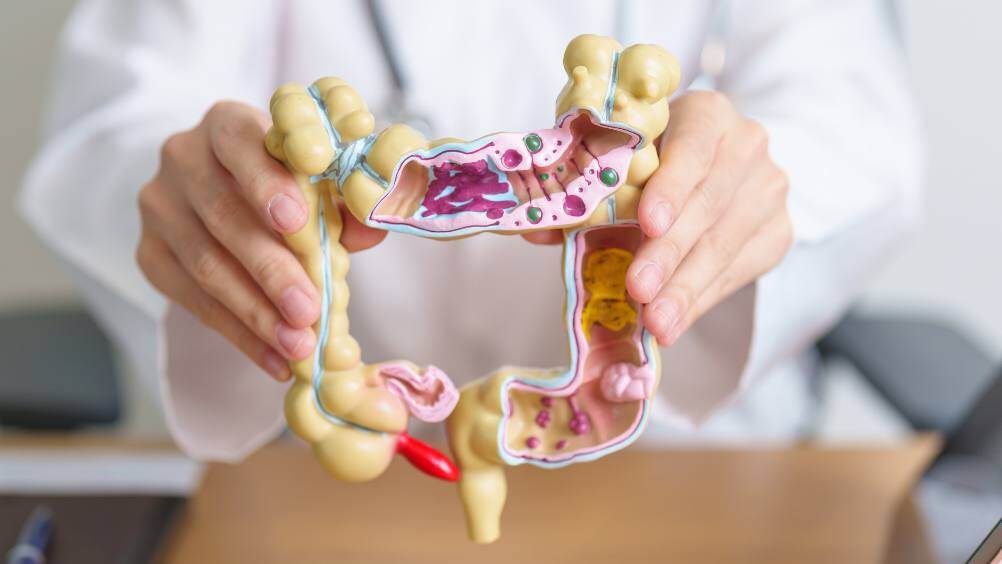As with other types of cancer, certain risk factors are known to increase the chance of someone developing colorectal cancer. Some of these factors — diet, obesity, smoking, and alcohol consumption — are related to lifestyle choices and can be controlled. Others, such as your age, your personal health, and your family history, cannot be changed.
Fortunately, only about 5% of colorectal cancers are hereditary or caused by inherited genetic mutations. A small percentage like that means it’s very important to know the factors that put you at risk so you’ll know when to start screening for colorectal cancer.
Understanding Colorectal Cancer
Colorectal cancer develops when cells in the colon or rectum grow out of control. Colorectal cancers often begin as polyps, or small, noncancerous clumps of cells that form inside the colon. Some of these polyps, however, can eventually become colon cancer. These polyps can also develop and become cancerous in the rectum.
Most cancerous polyps are very small and grow unnoticed unless they’re detected with a screening test. This means symptoms usually aren’t experienced until the cancer has progressed to a point where it’s harder to treat.
Who is At Risk for Colorectal Cancer?
Colorectal cancer can affect anyone. Still, people with certain risk factors are more likely than others to develop the disease.
Now more than ever, lifestyle choices play a big role in who develops colorectal cancer. This is becoming more evident in the number of people under 40 diagnosed with colorectal cancer in the past few decades. These factors, which can be controlled, include:
- Being overweight
- Not exercising
- Eating unhealthy, especially a diet that is high in processed foods (i.e., fast food, chips, highly preserved snacks)
- Smoking
- Alcohol consumption
- Consuming too much red meat
- Vitamin D deficiency
Making changes might be ideal if you have more than one risk factor in the list above. Don’t get overwhelmed trying to change your habits all at once, but take positive steps toward a healthier lifestyle. Not only will this lower your risk status for colorectal cancer, but it will also help lower your risk of developing other types of cancer, heart disease, and type 2 diabetes.
Non-lifestyle-related risk factors that can’t be controlled include:
- Age: Colon and rectal cancers commonly occur in people over the age of 50, although it is increasing among people under 50.
- Race and ethnicity: African Americans have the highest rate of colon and rectal cancers in the United States. Ashkenazi Jews (Jews of Eastern European descent) are also considered to be a high-risk group.
- Personal or family history: Your chance of developing colorectal cancer increases if you or a member of your family have had colorectal polyps or colorectal cancer.
- Personal history of other diseases: Conditions such as inflammatory bowel disease, ulcerative colitis, or type 2 diabetes put you at an increased risk for colorectal cancer.
- Inherited genetic syndromes: Lynch syndrome (HNPCC) and familial adenomatous polyposis (FAP) are also linked to an increased risk of colorectal cancer.
How Can You Reduce the Risk of Developing Colorectal Cancer?
According to the American Cancer Society, there are certain steps you can take in order to maintain a healthy weight, lifestyle, and diet — all of which can reduce cancer risk:
- Add regular exercise into your routine, aiming for 2 to 5 hours of moderate-level exercise or 1 to 2 hours of intense physical activity per week.
- Make movement a daily habit and take breaks from prolonged sitting and screen time.
- Incorporate fiber and nutrient-rich fruits, vegetables, and whole grains into your diet.
- Reduce how often you consume processed meats and foods, sugar-sweetened drinks, and refined grains.
Related Reading: Colorectal Cancer: Why Are More Younger People Being Diagnosed?
Getting Screened for Colorectal Cancer Is a Good Way to Be Proactive About Your Health
People with no risk factors from the lists above can develop colorectal cancer. That’s why getting screened is important — in fact, it has saved many lives! The goal of screening is early detection of colorectal cancer or even pre-cancerous polyps that can be removed before they turn into cancer.
Other than screening, there is nothing available to detect colorectal cancer at an early stage since it doesn’t show symptoms until it’s become more advanced. When symptoms do occur, they often include changes in bowel habits, abdominal cramping or pain, and rectal bleeding. While something other than cancer could be causing these symptoms, it’s best to schedule an appointment with your doctor rather than ignore them.
When Should I Start Colorectal Cancer Screening?
The American Cancer Society (ACS) recommends that average-risk individuals start regular colorectal cancer screenings at age 45. Those with a family history or a lifestyle that produces personal risk factors should talk to their doctor by age 30 about a screening schedule that’s right for you.
Colonoscopies are the standard when it comes to screening for colorectal cancer. However, many average-risk individuals are also able to utilize some at-home testing kits, especially before the age of 50. You can also read our blog about What You Need to Know About At-Home Colorectal Cancer Screening.
Remember, colorectal cancer screening can save your life or the life of a loved one. Rather than skip your screenings, The Willamette Valley Cancer Institute (WVCI) encourages you to schedule them as recommended by your primary care physician.
Expert Colorectal Cancer Care in Willamette Valley
At Willamette Valley Cancer Institute, we offer the latest in colorectal cancer treatments and are here to provide you with an individualized treatment plan. If you are diagnosed with colorectal cancer, make an appointment with one of our specialists at a location convenient to you in Albany, Corvallis, Eugene, Florence, Lincoln City, or Newport, Oregon.



